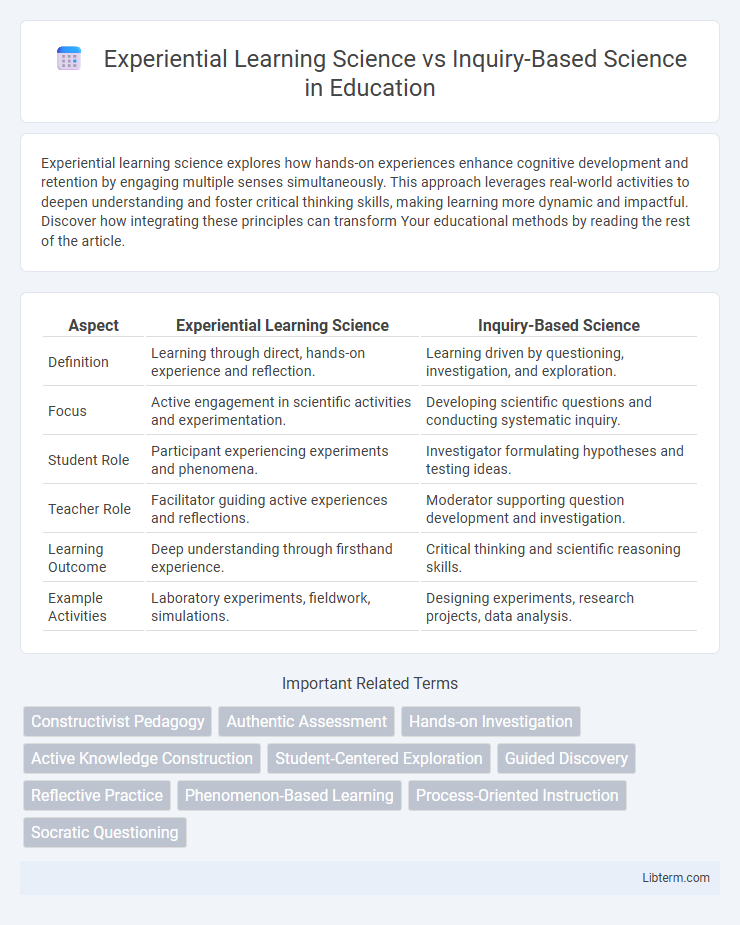Experiential learning science explores how hands-on experiences enhance cognitive development and retention by engaging multiple senses simultaneously. This approach leverages real-world activities to deepen understanding and foster critical thinking skills, making learning more dynamic and impactful. Discover how integrating these principles can transform Your educational methods by reading the rest of the article.
Table of Comparison
| Aspect | Experiential Learning Science | Inquiry-Based Science |
|---|---|---|
| Definition | Learning through direct, hands-on experience and reflection. | Learning driven by questioning, investigation, and exploration. |
| Focus | Active engagement in scientific activities and experimentation. | Developing scientific questions and conducting systematic inquiry. |
| Student Role | Participant experiencing experiments and phenomena. | Investigator formulating hypotheses and testing ideas. |
| Teacher Role | Facilitator guiding active experiences and reflections. | Moderator supporting question development and investigation. |
| Learning Outcome | Deep understanding through firsthand experience. | Critical thinking and scientific reasoning skills. |
| Example Activities | Laboratory experiments, fieldwork, simulations. | Designing experiments, research projects, data analysis. |
Introduction to Experiential and Inquiry-Based Science
Experiential Learning Science emphasizes hands-on, direct engagement with scientific phenomena, encouraging learners to construct knowledge through active participation and reflection on real-world experiences. Inquiry-Based Science centers on questioning, investigating, and exploring scientific problems, allowing students to develop critical thinking skills by formulating hypotheses and conducting experiments. Both approaches foster deeper understanding by promoting active learner involvement but differ in their methods of guiding exploration and knowledge construction.
Defining Experiential Learning in Science Education
Experiential learning in science education emphasizes active engagement through hands-on experiences, allowing students to directly interact with scientific phenomena and apply theoretical concepts. This approach fosters deeper understanding by encouraging observation, experimentation, and reflection, contrasting inquiry-based science which centers on questioning and exploring to construct knowledge. Key elements include concrete experience, reflective observation, and active experimentation, making learning meaningful and contextually relevant.
Understanding Inquiry-Based Science Methods
Inquiry-based science methods emphasize active student participation in posing questions, conducting investigations, and analyzing data, fostering deep conceptual understanding and critical thinking skills. Unlike experiential learning, which centers on hands-on experiences, inquiry-based approaches guide learners through structured scientific processes that mirror authentic research. This method enhances scientific literacy by encouraging hypothesis formation, experimental design, and evidence-based reasoning.
Core Principles: Experiential vs Inquiry-Based Approaches
Experiential learning emphasizes active engagement through direct experience and reflection, fostering hands-on understanding and personal connection to scientific concepts. Inquiry-based science centers on questioning, investigation, and exploration, encouraging students to develop hypotheses and seek evidence independently. Both core principles promote critical thinking, but experiential learning prioritizes learning by doing, while inquiry-based approaches focus on intellectual discovery through systematic inquiry.
Learning Outcomes: Comparing Student Engagement
Experiential learning science fosters student engagement by immersing learners in hands-on activities that connect theory with real-world experiences, enhancing retention and practical understanding. Inquiry-based science promotes engagement through active questioning, exploration, and critical thinking, encouraging students to construct knowledge independently. Studies indicate that while both methods boost engagement, experiential learning often results in higher motivation and deeper emotional connection to content, whereas inquiry-based approaches excel in developing analytical and problem-solving skills.
Classroom Implementation Strategies
Experiential Learning Science emphasizes hands-on activities and real-world experiences, encouraging students to learn through direct interaction with materials and phenomena, which enhances engagement and retention. Inquiry-Based Science centers on asking questions, forming hypotheses, conducting investigations, and drawing conclusions, fostering critical thinking and scientific reasoning skills. Effective classroom implementation combines structured experiments, guided reflection, and open-ended questioning to balance active participation with cognitive development, ensuring comprehensive science learning outcomes.
Assessment Techniques for Each Approach
Experiential learning science utilizes performance-based assessments, such as hands-on projects and real-world problem-solving tasks, to evaluate students' practical application of concepts and reflective understanding. Inquiry-based science relies heavily on formative assessments, including observation, questioning, and iterative hypothesis testing, to measure students' investigative skills and critical thinking throughout the learning process. Both approaches incorporate rubrics and self-assessment strategies, but experiential learning emphasizes direct experience and reflection, whereas inquiry-based learning focuses on the scientific method and evidence-based reasoning.
Advantages and Challenges of Experiential Learning
Experiential Learning Science fosters deep understanding by engaging students in hands-on, real-world scientific activities, enhancing critical thinking and retention. Its advantages include promoting active participation and practical skill development, while challenges involve resource intensity, the need for skilled facilitators, and time constraints. Addressing these challenges can maximize learning outcomes and bridge the gap between theory and practice in science education.
Benefits and Limitations of Inquiry-Based Science
Inquiry-Based Science promotes critical thinking and problem-solving skills by engaging students in questioning, investigating, and reasoning, fostering deeper conceptual understanding. Its benefits include increased student motivation and hands-on learning experiences that mirror scientific practices, but limitations involve potential gaps in content coverage and challenges in classroom management. In contrast, Experiential Learning Science emphasizes direct experience and reflection, providing concrete learning opportunities but may lack the structured inquiry process essential for developing analytical skills.
Choosing the Right Approach for Your Classroom
Experiential Learning Science emphasizes hands-on activities that immerse students in real-world scientific phenomena, fostering deep understanding through direct experience. Inquiry-Based Science prioritizes curiosity-driven questioning and investigation, encouraging learners to formulate hypotheses and explore concepts independently. Selecting the right approach depends on your classroom goals: use Experiential Learning to enhance practical skills and concrete understanding, while Inquiry-Based Learning thrives in environments promoting critical thinking and scientific inquiry.
Experiential Learning Science Infographic

 libterm.com
libterm.com